Google remarketing allows you to target your previous website visitors with adverts when they’re browsing the web away from your site.
Consider remarketing to be a reminder to visitors of your website. By using a special tracking code, cookies are stored on users’ browsers that allow adverts to follow them around the web on the Google Display Network – a network of websites covering over two million websites that reach over 90% of people on the Internet – making them more likely to convert.
By reminding users that have previously viewed products or services on your website, they’re much more likely to click back on to your website and make a purchase. Its an effective form of ‘drip feed’ marketing that is having a big impact on businesses in many different sectors.
Google remarketing for healthcare
Remarketing can be particularly effective in healthcare marketing. If you provide a specialist service or sell healthcare products and somebody lands on your site to learn more about them, you can continue to target them with adverts of your business once they’ve left your site. This is known as standard remarketing.
There is also dynamic remarketing, which shows users adverts of the specific products and services related to the pages they’ve viewed before, or other similar products or services that they didn’t access whilst on your site.
Maximising your remarketing potential
If you use videos on your website or have a YouTube channel, and somebody interacts with it, Google remarketing can target them after their visit. Its important therefore to have strong call to actions in your videos, blogs and emails, to ensure you’re pointing users in the right direction.
If you have an email list for your customers, you can use a tool called ‘Customer Match’ which allows you to share your customer data with Google to target adverts towards them. This is useful for targeting particular segments of your customer base, such as high value clients.
You can optimise the performance of your customer match ad campaigns by integrating your email analytics to target audiences with specific ads based on their behaviours with your emails. For example, if you have a group of email recipients that only open your emails when you have an offer in the header, your ads should reflect this.
Additionally, if you are looking to drive sales for a particular product or service, you can offer a discounted price or some other reward to encourage visitors to return to the page to make a purchase.
If you have regular requests for specific products and services at certain times of the year, remarketing can be used proactively and pre-emptively to target the people who make those requests. This is why its important to link your Google Analytics and Google Adwords accounts so that you can guarantee you’re targeting your ads based on genuine website activity, instead of guesswork.
Leveraging the data found in your Google Analytics account can also help drive customers down the sales funnel by targeting different ads and call to actions at users who show different behaviours on your site. For example, if you have a demographic who spend more time on your homepage and another demographic that spends more time in the services section, you can drive the former to the services page as they’re higher up the sales funnel, and the latter to making a purchase as they’re further down.
Restrictions
Google does have some restrictions in place for healthcare marketing and remarketing. You cannot specify or suggest in your ads that your target audience has a specific health issue, as this could be perceived as using knowledge of their condition to target them.






